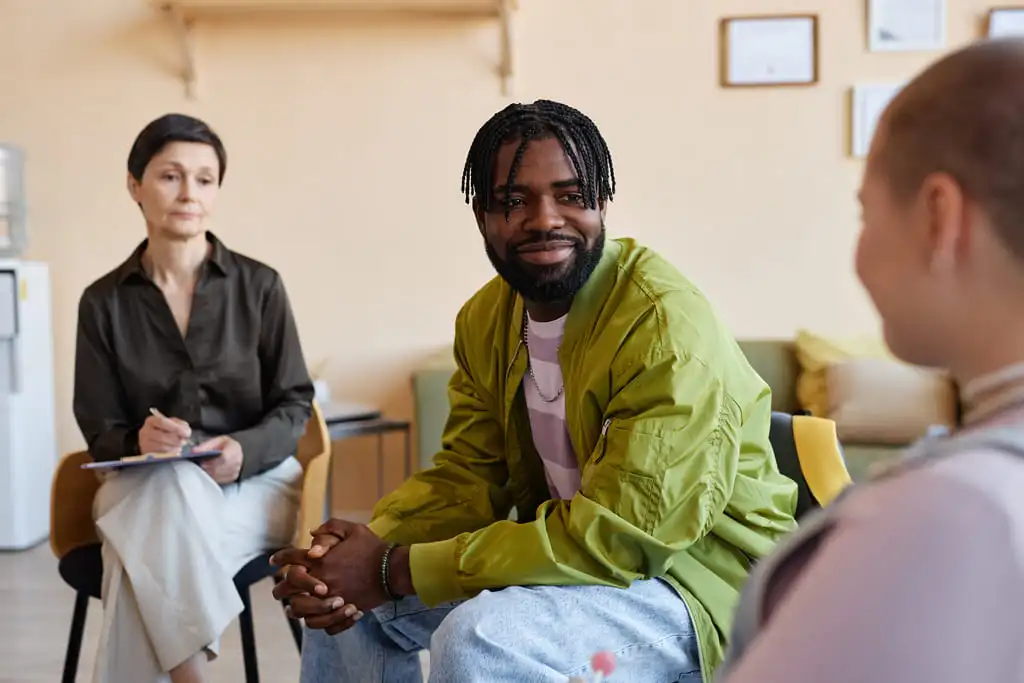Transitions from the hospital to the community require carefully planned, holistic, and integrated support, placing the person at the heart of the process. Every person is unique, with individual life experiences, needs, and abilities.
By working closely with the people we serve, our therapy team tailors interventions to specific needs, encourages independence and ensures that each step aligns with their goals. Community Transition Services (CTS) provides comprehensive support and coordinates care and resources to help people transition into nurturing community-based environments where they can thrive.
Importance of Therapy Team in CTS
A dedicated therapy team plays a crucial role in the success of CTS, ensuring that people receive support tailored to their specific needs during their transition from hospital to community-based settings.
These teams usually comprise health and social care practitioners and specialists who work collaboratively to provide personalised care plans that address each person’s immediate and long-term needs.
Therapy teams also provide essential education and training to care recipients and their families, empowering them with the knowledge and skills to manage their well-being effectively at home.
Furthermore, the presence of a therapy team in CTS ensures a more seamless and coordinated approach to care. By working closely with other healthcare providers and social care services, therapy teams help bridge gaps in service delivery, ensuring that each person’s transition from the hospital is as smooth and supported as possible.
This integrated care approach enhances recovery outcomes and contributes to a more efficient health and social care system, ultimately benefiting both people requiring support and the wider community.

Responsibilities of Therapy Teams
At LD Network, our speech and language therapists and occupational therapists work closely with our internal multidisciplinary team of Positive Behaviour Support (PBS) specialists and community psychiatric nurses. Together, they ensure a safe, smooth and effective transition from the hospital to the community. Further, our therapy team works with people’s families, caregivers and other health and care professionals, providing additional education and support.
Getting to Know the Person
The first step in the community transition process is getting to know the person, their strengths, skills, and history. Through personalised and humanised support, the therapy team builds genuine connections with the care recipient, getting a clear picture of their well-being and where they see themselves in the future. For people who require complex care or with communication difficulties, the thearpy team ensures support is tailored to their unique needs. This also helps create a holistic care plan, which is necessary for the transition process and future care and support in the community.
Personalised Care Planning
Personalised care plans are designed with multiple care and support disciplines working together. LD Network’s Community Transition Services include a team of speech and language and occupational therapists, PBS specialists and community psychiatrist nurses, working collaboratively with the person’s care team to develop the most person-centred care plan possible.
Personalised care planning focuses on the following:
- Ensuring a safe and effective transition
- Identifying and supporting people’s unique needs, strengths and talents
- Respecting people’s autonomy and individual choices
- Supporting people to participate in their care plans actively
- Creating a nurturing and supportive environment where people can grow, thrive and achieve their aspirations
Therapeutic Interventions
With extensive professional experience working with the NHS and the National Autistic Society, our therapy team is committed to helping people achieve their best possible outcomes, support their strengths, and thrive.
Our person-centred approach involves therapeutic practices focused on collaboration in care and decision-making processes while reducing restrictive practices. We provide the following:
- Functional assessment
- Cognitive behaviour assessment
- Environmental assessment
- Specialised support strategies in Eating, Drinking & Swallowing
- PACE model of care
- PERMA model of well-being
- Support with proactive and active calming strategies
- Support with Talking Mats, a visual communication system for people with communication difficulties
- Support with multimedia and assistive technology (multimedia avatars, visual charts, video stories)
- Trauma-informed care
- Teletherapy
- Mindfulness techniques
- Restraint reduction practices
Education and Training
Therapy teams are responsible for staying updated with the latest therapeutic approaches, research, and best practices to ensure they can provide the most effective support. This involves engaging in ongoing professional development activities, such as attending workshops, conferences, and specialised training sessions that enhance their skills and knowledge.
Additionally, therapy teams play a crucial role in educating other members of multidisciplinary teams. They provide training on specific therapeutic techniques, tools, and strategies, helping to build the overall competency of the team.
By sharing their expertise, our therapy teams ensure that all professionals involved in care are well-equipped to deliver holistic, person-centred support, fostering a collaborative approach that enhances the quality of care provided.
Coordination and Communication
The role of a therapy team in coordination and communication is crucial for delivering humanised and effective care. Therapy teams ensure that all participants in people’s care, including healthcare professionals, caregivers, and families, are aligned in their understanding of the care recipient’s needs and the strategies in place to support them.
This involves regular meetings, clear documentation, and the use of various communication tools to share updates, progress, and risk assessment plans. Additionally, therapy teams coordinate the different aspects of care, organising schedules and aligning goals across disciplines to maintain a unified, person-centred approach that improves outcomes.
Improving Overall Well-Being
The role of a therapy team in improving people’s well-being is central to their work, focusing on enhancing physical, emotional, and social well-being through tailored interventions and personalised care plans.
They assess each person’s unique needs, preferences, and strengths, developing strategies that promote independence, resilience, and overall quality of life. By providing holistic therapeutic interventions, therapy teams support people to overcome challenges, build essential skills, and fully engage in their communities.
Through consistent monitoring and adjustments to care plans, they ensure that progress is sustained and that the strategies in place continue to meet the evolving needs of each person.
Community Transition Services with LD Network
At LD Network, our Community Transition Services help people holistically transition from hospital to community-based settings. We offer a comprehensive, proactive approach to ensure personalised care that meets each person’s unique needs.
We build strong, trustworthy partnerships to make the transition to a home-like environment as smooth as possible. Our commitment is to uphold people’s rights and support them in living fulfilling lives within their communities.
Contact us today for urgent transition and crisis support. Learn more about how our services help reduce hospital readmissions and improve quality of life.ha












